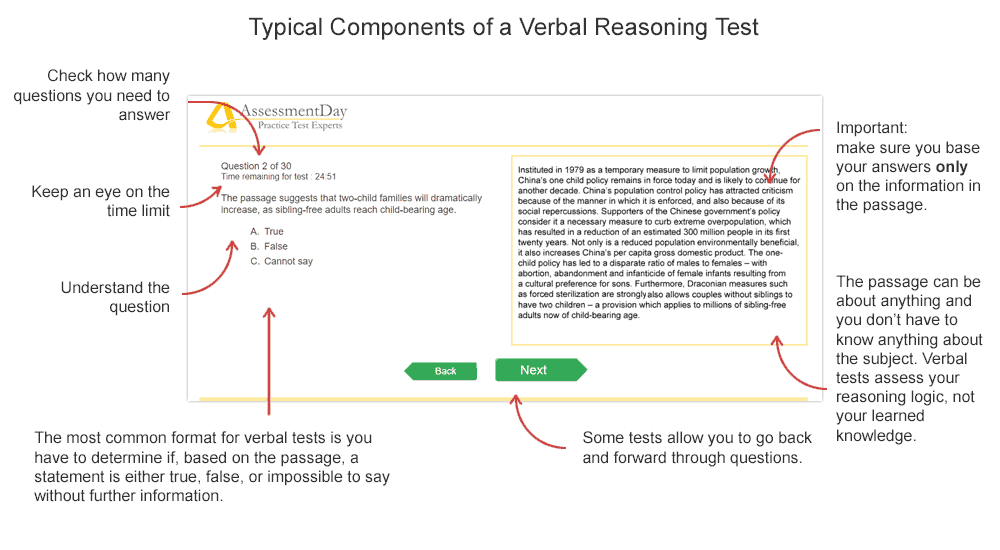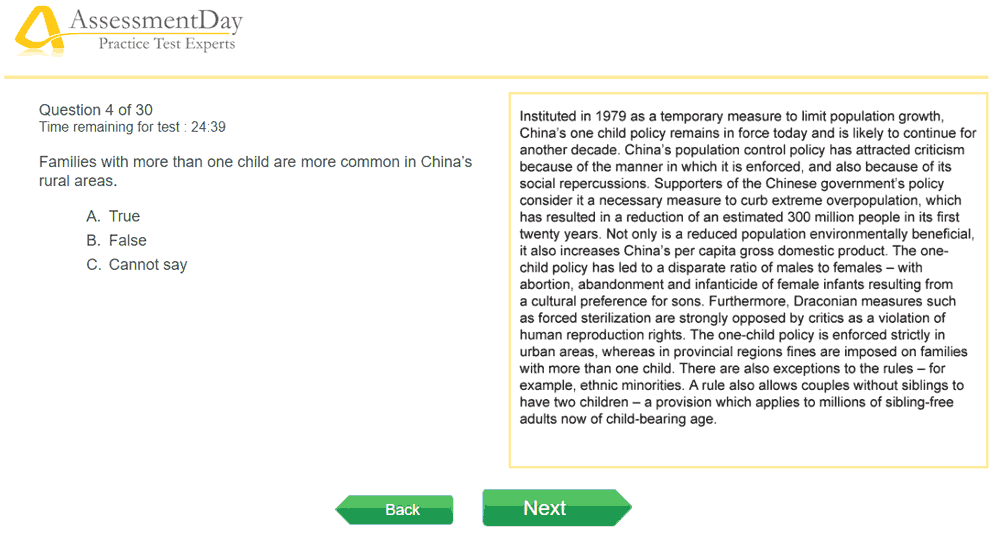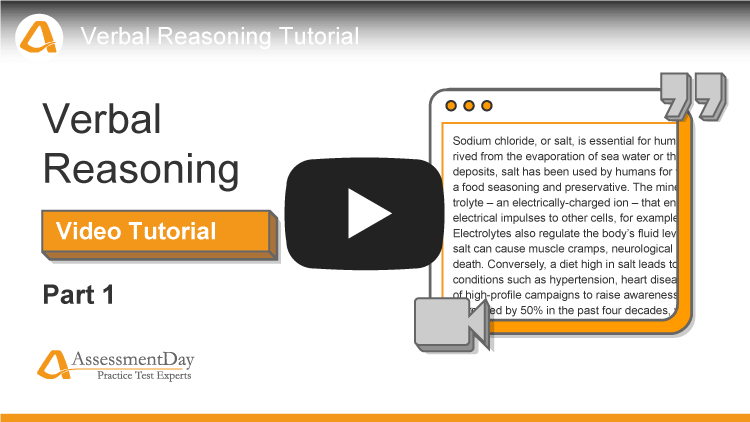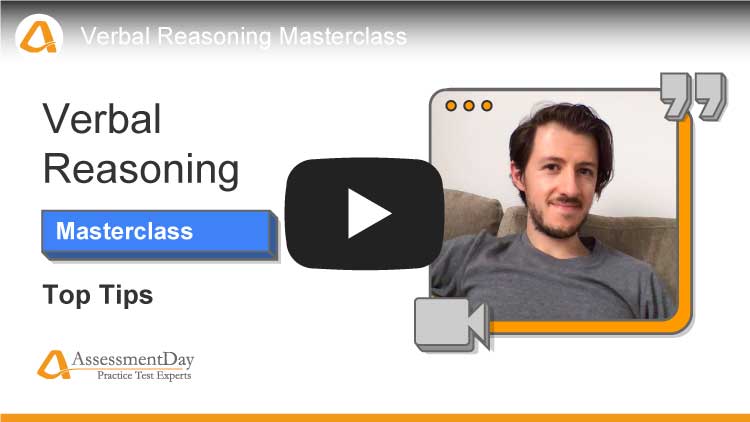
To help you pass verbal reasoning tests, use these practice assessments, advice, and solutions to help you increase your score.
Updated: 9 August 2022
Are you due to take a verbal reasoning test for your job application? We provide advice, tutorials, and all the preparation you will need with our practice tests. The psychometric tests on AssessmentDay simulate the tests used by employers. You can attempt a sample verbal test below so that you can become familiar with the industry-standard style and layout. You are likely to only perform at your best in a psychometric test if you are familiar with the format of the test style, and typically know what to the process is like.
Verbal reasoning tests assess your ability to understand and comprehend written text. They are designed to measure your verbal comprehension, reasoning and logic, all through your understanding of language. Some people when reading a statement jump to conclusions or misinterpret information - this is what the test will be able to find out about you.
Verbal reasoning tests are multiple choice and you will have to select from three possible answer options: True, False, and Cannot Say.
You can see two screenshots of verbal reasoning example questions below:


Verbal reasoning tests are designed to measure your cognitive skills. These typically include logic, comprehension, and reasoning. This skills will be used when answering the questions. The more questions you get correctly, you will be displaying these skills. Your score will be measured against other participants in your norm group.
It is good to know that spelling is something that is not tested as part by the verbal test. The test is going to measure your cognitive ability, not your spelling. Vocabulary and spelling are things are that can be learned on the job, whereas verbal ability is an innate capability unique to each person.
By taking example verbal reasoning tests you will become familiar with the question format. Luckily for you, most employers use a similar format of verbal reasoning test, which means it's easy to get familiar with them. We do recommend you try to find out which test publisher creates the verbal test you are sitting so you can check if it's a different format.
As mentioned, you will have three answer options to choose from: True, False and Cannot Say. Here is a useful explanation for the meaning of each of the three verbal reasoning answer options. You will need to know this if you are to score highly.
The following video is a verbal reasoning tutorial, here we discuss a question and take a look at how you would answer it.

Here you can take our free verbal reasoning test, with questions and answers pdf to enjoy offline. Try our sample verbal reasoning test now to assess your current verbal reasoning skills level.
This shortened verbal reasoning test contains 9 questions and has a time limit of 10 minutes. We rate this as medium difficult and is typical of the same level as graduate employer verbal reasoning tests.
Get a good night's sleep before your test so that you stay focused during your real test. It's tempting to treat an online test less seriously, but be sure you are focused and alert. If it's at an assessment centre then arrive in plenty of time so that when you sit down to take your test you are calm and collected.
Make sure you understand the instructions. Don't skip past them, be sure to read them all as there may be something important in there.
Make sure you are comfortable and will not be disturbed or distracted. Close the door, make sure you have enough free time to take the test and don't let any friends or family bother you.
Have an idea of how much time to allow yourself for each question and know when to move on. Concentration is essential, especially when every second counts. If you're really stuck, think about whether it's worth moving on. It can sometimes be worth having a guess and moving onto a question you're more likely to answer correctly.
Base your answers on only the information contained in the passage. This is crucial, and if you don't do this you will probably get a lot of the questions wrong. Verbal reasoning tests are not tests of what you know, they are tests of how well you understand written information.
The following video is a verbal reasoning masterclass, outlining some top tips to help you with your tests.

By far the most common form of verbal reasoning test is one in which you are presented with a passage of text, then asked whether certain statements relating to that text are true, false, or impossible to say without more information. Some employers also test things such as word meaning, for example "which word is the odd one out". But these are rarely used anymore as they can be culturally biased. Although this particular style of verbal reasoning test is the most common, it always best to check online to see if it reveals the test publisher used.
Verbal reasoning tests are designed to measure your powers of comprehension, reasoning, and logic. You will be tested on whether you jump to conclusions or you appreciate the limitations of a statement. If a passage says "it has been reported. " it does not follow that the reported aspect is necessarily true; only that it has been reported. Another classic example is: if the lights in a house come on, does that mean there is someone inside the building? Not necessarily. If A is bigger than B, does that mean B is small? Not necessarily. You will be tested to sort fact from inference, a lot like what's required in a real work environment. You can see why lawyers almost always have to pass a verbal reasoning test, or a critical thinking test. Something which will not be tested by the verbal reasoning tests used by employers is spelling. The employer is trying to measure your reasoning ability, not your vocabulary or spelling. This knowledge can be learned on the job, whereas verbal ability is an innate capability unique to each person. Recruitment tests are nothing to do with old-fashioned tests such as word association or missing words.
It helps, but more important than speed is how well you understand what you are reading, and recognising the difference between fact and inference. Aptitude tests are normally strictly timed. The assessor will be able to see how many questions you attempted and how many of those you answered correctly. So you will need to strike a balance between attempting lots of questions and getting correct those you have attempted. For most aptitude tests you will find it difficult to answer all the questions within the time limit. However some tests allow a lot longer and they are all about your analysis and reasoning ability.
If it's done properly, yes. A verbal reasoning test is much more fair on candidates than a subjective form of assessment, such as an unstructured interview, because it presents questions of similar difficulty to all candidates and is objectively scored. The results from verbal reasoning tests also tend to be less affected by background or race, so they are beneficial to both candidates and employers.
Get a completely free starter account to AssessmentDay